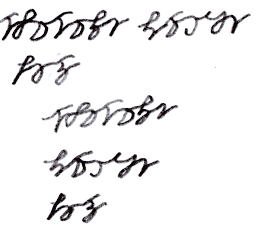The conversation with Dark_Brood continued on other topics, and eventually made it to the anime I'm currently watching:
Fate/Stay Night. Amusing, with an interesting take on some mythology, if somewhat cliched (including the typical anime inconsistency). Watching this brought up a serious discussion about Japan. Now, we both realize that anime isn't real (heck, this anime has a female King Arthur, Heracles, Medea, and Gilgamesh all in present day Japan); but we both believe that consistent themes in anime writing can be used to deduce the perspectives of the writers and the target audience.
FusionReactorII says (5:13 PM):
This is not the most politically correct anime
FusionReactorII says (5:14 PM):
There seems to be a "good" progression of Arthur [that's King Arthur; a female, in this anime] to a more traditional female, over the course of the series
FusionReactorII says (5:15 PM):
Seems like it's making a few political/social statements
FusionReactorII says (5:15 PM):
Though I suppose it IS anime. And Japan is such a weird mix of sexual liberalism and conservativism :P
FusionReactorII says (5:16 PM):
In some ways they're much more liberal about sexuality than in the US, in other ways much more conservative
dark_brood says (5:17 PM):
They're much more liberal, except that males are like a superior race to females.
FusionReactorII says (5:17 PM):
Heh
dark_brood says (5:18 PM):
A man can pretty much do what he wants (sexually) a woman, uh oh.
FusionReactorII says (5:20 PM):
Well, to some extent. Women may be more free to do what they want sexually in Japan, but it seems like traditional gender roles are stronger than in the US. Stuff that I see in anime just looks old fashioned to me, with regards to gender roles
FusionReactorII says (5:20 PM):
Like how people might have thought like 50 years ago in the US :P
FusionReactorII says (5:22 PM):
Then again, there are a large number of people in more rural areas int he US, which tend to be more conservative, and with which I'm not particularly familiar with
FusionReactorII says (5:22 PM):
Maybe I'm just more acquainted with the more liberal parts of the US :P
dark_brood says (5:23 PM):
I was partly also referring to the even bigger underreportedness (that's not a word I think) of rape in Japan than most other countries.
FusionReactorII says (5:25 PM):
Heh. Did you see Melancholy?
dark_brood says (5:25 PM):
Ye
dark_brood says (5:25 PM):
Not all but alot
FusionReactorII says (5:25 PM):
I was just remembering the one girl saying "If I'm ruined for marriage, will you take me?" When I saw that I was thinking "What... the heck..?"
dark_brood says (5:29 PM):
"In a United States study of women college students, Koss et al. (1988) found that about 21 per cent of stranger rapes were reported and only 2 per cent of acquaintance rapes were reported." wow
FusionReactorII says (5:30 PM):
Wow
dark_brood says (5:31 PM):
I'm not quite clear if that study was done in Japan or in the US, could it be possible that it was done by the US in Japan?
dark_brood says (5:31 PM):
It's from a paper on rape in japan
FusionReactorII says (5:32 PM):
Huh
dark_brood says (5:33 PM):
"This notion implies that acquaintances cannot be true rapists. In Japan, this idea is reinforced by the way police handle rape. They tend to accept only rape reports that resemble ‘classic rapes’, sexual intercourse with physical force, committed by a stranger in a secluded public place at night."
FusionReactorII says (5:34 PM):
Yeah, I've definitely seen indication of that in anime
dark_brood says (5:34 PM):
"In the United States the police frequently rule these type cases as ‘unfounded’." (the opposite)
FusionReactorII says (5:35 PM):
In fact I'd noticed that before. Like you stick a guy and a girl in a room alone [in anime], and everyone assumes they're just GOING to have sex, regardless of the relationship between them
FusionReactorII says (5:35 PM):
Seems archaic, to me
dark_brood says (5:35 PM):
Ye











